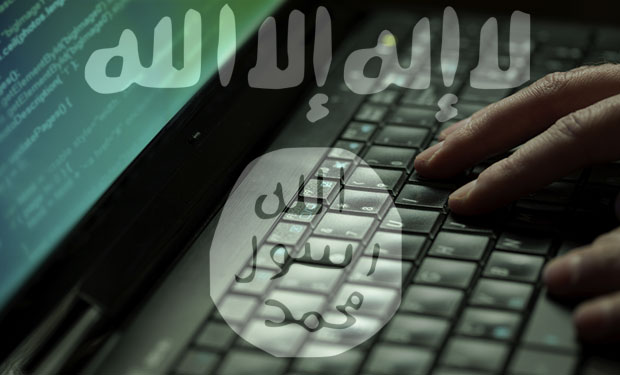Online Attacks Slam France After Paris Massacre
By Mathew J. Schwartz, January 16, 2015.

Images of the seal of Muhammad and Islamic creed as seen on the ISIS flag.
The United States and Great Britain plan to hold "cyber war games" to increase cooperation between the two nation's law enforcement and intelligence agencies and better defend the countries against online attacks. The move comes as France reveals that it has seen a massive spike in online attacks and defacements targeting French websites following the Paris massacre.
See Also: Mobile Banking Success Criteria: Scalability, Outsourced & In-The-Cloud
British Prime Minister Cameron arrived in Washington late Jan. 15 for meetings with President Barack Obama. Once there, Cameron announced that their two countries plan to participate in their first-ever joint "cyber attack war games," the BBC reports. Agents from both the FBI and British domestic intelligence service MI5 will comprise what Cameron dubbed the "cyber cells" that will participate in the exercises, which are designed to increase information sharing. The drills will begin with a simulated attack against the Bank of England and commercial banks, although no related date has been announced, the BBC reports.
For fighting online attacks, "GCHQ has massive expertise," Cameron said in a Jan. 15 press conference, referring to the U.K. intelligence agency, according to IBTimes. "Cyber-attacks is one of the big modern threats that we face. This is a real signal it's time to step up the efforts and to do more."
President Obama also characterized online attacks - such as the hack against Sony Pictures - as being an "urgent and growing danger."
Cameron plans to lobby Obama to support new laws that would require social networks to monitor their users more carefully, as well as to weaken encryption, by giving intelligence agencies a way to monitor communications that are encrypted from end to end (see: Cameron to Ask Obama to Help Weaken Crypto).
But information security experts and privacy rights groups have characterized the anti-crypto moves as being technically unworkable, especially given the array of free, full-strength encryption tools that are currently available. Furthermore, civil rights groups have warned that those plans weaken the banking and e-commerce sectors, in particular, thus putting people at greater risk from online attackers. "Ban encryption and you cause much more damage than the most ambitious terrorist can imagine," Peter Sommer, professor of cybersecurity and digital evidence at Britain's de Montfort and the Open Universities, tells Information Security Media Group.
France Sees Online Attack Spike
In France, meanwhile, hackers have targeted 19,000 of the country's websites since the Paris massacre, says Rear Admiral Arnaud Coustillière, who heads the Cyber Security Department of the General Headquarters of the French Army.
Since the Jan. 7 attacks that began with the massacre at Charlie Hebdo and ultimately left 20 people dead, the French sites have largely been disrupted via distributed denial-of-service attacks or else vandalized, with attackers leaving messages such as "Death to France" and "Death to Charlie," reports French daily newspaper Le Parisien. Some sites have also been defaced with a picture of the flag of the terrorist group that calls itself the Islamic State, which is also known as ISIS or ISIL.
In France, the attacks are being labeled as a "cyber-jihad," and sites of every description have reportedly been defaced - ranging from government websites for military regiments, to mom-and-pop pizza shops. "What's new, what's important, is that this is 19,000 sites - that's never been seen before," said Coustillière, the Associated Press reports. "This is the first time that a country has been faced with such a large wave of cyber-contestation."
Coustillière ascribed the attacks to "more or less structured" groups, including what he says are some well-known, Islamist extremist organizations. The French government has reportedly beefed up its online defenses and instituted nonstop monitoring of websites in response to the increase in disruptions and defacements.

